If a plumber responds to a choke or blockage at a private property that is connected to the public sewer system, the City will reimburse a maximum of one hour of labor, along with one hour of drain machine hire, totaling up to a maximum invoice value of $250 plus GST. This policy will be effective from January 1, 2024. The one hour of work includes the following tasks:
- Inspecting the inspection shaft
- If the inspection shaft is holding water, attempting to clear it with a drain machine
- Checking the upstream manhole
- Checking the inspection shaft of the adjacent property
- Notifying CKB Wastewater Services staff
Please note that any costs related to locating the inspection shaft and any plumbing work conducted upstream of the inspection shaft will be the responsibility of the property owner.
Who owns the Sewer?
Are you unclear about where your responsibilities as a property owner in relation to your sewer line begin and end?
Please click on the link below to find out who holds responsibility.
To see the drawing click he re.
re.
Where does the sewer main run?
To see a detailed view of the City's sewer system please Click Here.
What causes blockages?
When fats, oils, and grease are disposed of down the drain, they can congeal into large, thick masses that clog sewer pipes, leading to blockages and overflows. This creates environmental health concerns, traffic hazards, and the potential for flooding in homes and businesses. Both residential households and commercial food handling establishments contribute to this issue.
Food items such as cooking oils, milk, cheese, butter, and gravy contain fats, oils, and grease and should never be poured down the sink.
Preventing blockages in your home
- Please refrain from disposing of cooking oils and fats down the sink. Instead, allow the liquid oil or fat to cool in a sealable container, or wrap it in paper before placing it in the general waste bin.
- Prior to rinsing, wipe down pots and pans that are oily with a paper towel, and then dispose of the used paper towel in the bin.
- Avoid washing food scraps, tea leaves, or coffee grounds down the sink. Utilizing a strainer or screen over the drain while rinsing dishes is advisable, and the collected waste should be disposed of in the bin.
- Disposing of household chemicals down the drain can result in corrosion of your pipes over time, potentially weakening the main sewage line.
- Be alert for signs of a sewer blockage, which may include slow drainage in your toilet, sink, shower, or bath; gurgling noises from your drains; strong odors; or sewage overflow in your home or yard.
Foods such as cooking oils, milk, cheese, butter, and gravy contain fats, oils, and grease, and should never be disposed of down the sink.
Preventing blockages in your workplace
- Strain or filter oil in deep fryers to prolong the life of the cooking oil.
- Use an absorbent paper towel to absorb fats and grease from beneath fryer baskets and place it in the general waste bin.
- Minimize the use of dish soap during dishwashing operations, as it emulsifies fats, oils, and grease, allowing them to pass through a grease trap.
City representatives are available to meet with businesses to discuss best practices and solutions for the disposal of fat, grease, and oil.
Please call the City at 9021 9600 to schedule an appointment.
Only Paper, Pee and Poo belong down the loo!
Did you know that flushing anything other than the three P's (Toilet Paper, Pee, and Poo) down the toilet can negatively impact your internal plumbing and the main sewer line? Foreign objects such as feminine hygiene products, baby wipes, nappies, condoms, and rags or clothing can block the sewer and lead to significant issues. Even small items like hair, dental floss, and cotton buds can become trapped in the pipes and accumulate, potentially causing obstructions and blockages. The safest approach for disposing of these materials is to place them in the bin.
Remember your toilet is not a rubbish bin!

Fats, Oils and Grease in the home
Fats, oils, and grease should not be disposed of down the drain. As they cool in the sewer system, they quickly solidify and adhere to the walls of pipes, leading to potential clogs. When combined with other materials, such as wet wipes, the risk of blockages increases significantly. The pipes connecting your home to the main sewer line are only a few inches wide, making them susceptible to obstruction. If a blockage occurs on the residential side of the sewer junction, you will be responsible for hiring a plumber to resolve the issue. Furthermore, human waste can back up into your street, garden, or home, resulting in an unpleasant and costly situation that is entirely preventable.
What to do:
- Recycle used cooking oil or dispose of it appropriately by transferring it into a sealable container and placing the sealed container in the waste bin.
- Dispose of food scraps in the waste bin, not in the sink.
- Before washing pots, pans, and dishes, please wipe them with dry paper towels and discard the used towels in the bin.
- When rinsing dishes or preparing food by peeling or cutting, use a catch basket or screen over the drain, and dispose of any leftover scraps in the trash.
What not to do:
- Please refrain from using a garbage disposal or food grinder, as grinding food does not eliminate fats, oils, and grease. Even non-greasy food scraps can obstruct your home’s plumbing and sewer system.
- Additionally, avoid pouring cooking oil, pan drippings, grease, or sauces down the sink or toilet.
Below are some images of the sewer lines around Kalgoorlie-Boulder
This image is showing a nice clean sewer pipe
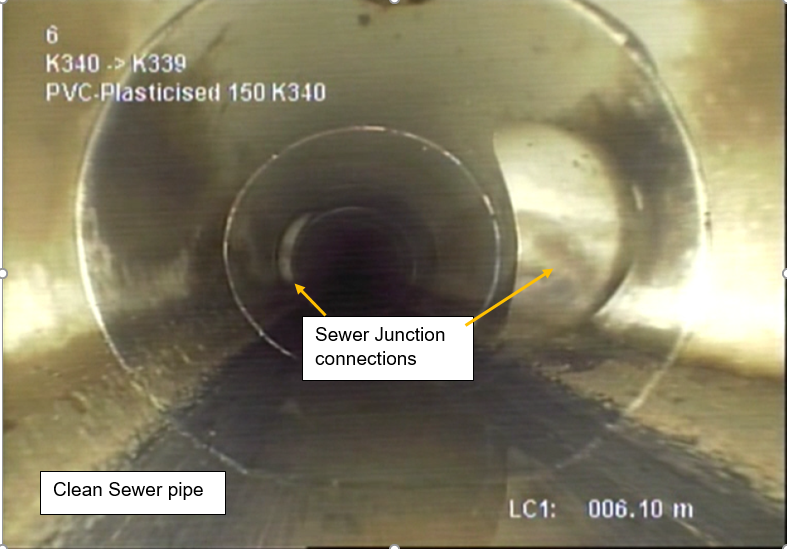
The below image is showing a build up of Grease/fats in the main sewer pipe
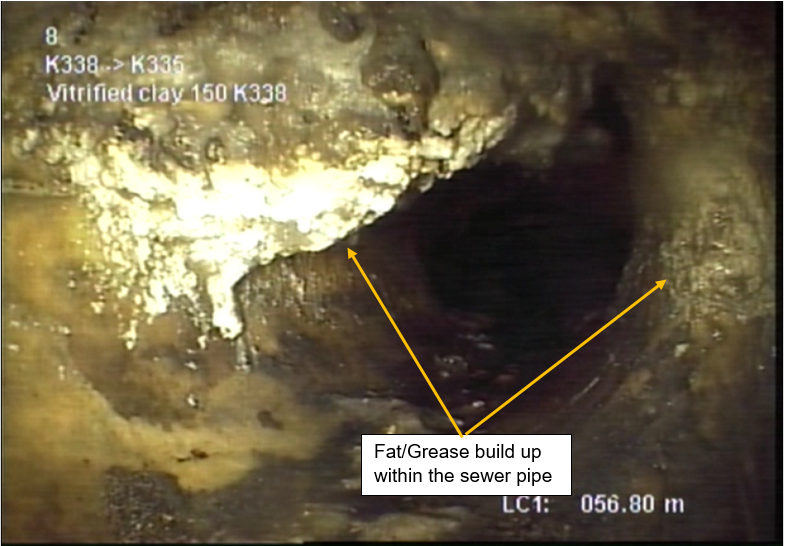
The below image is of fat build up at the junction point leading into the main sewer line.
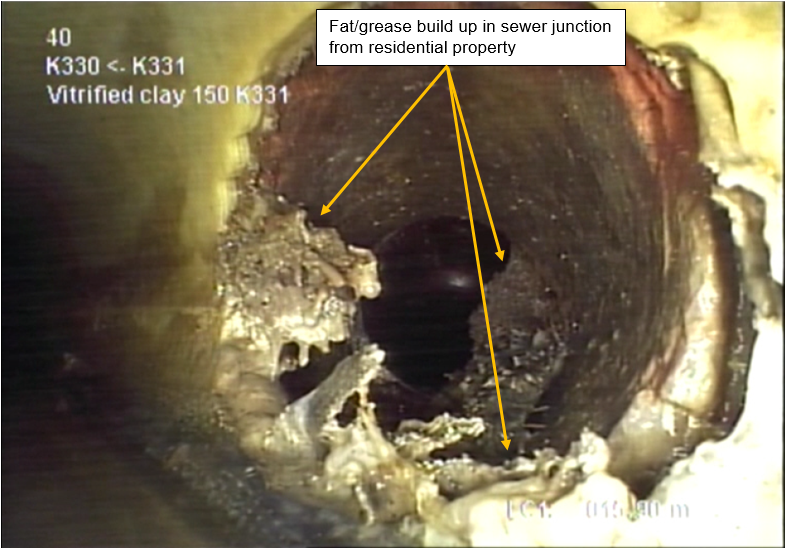
Some images of solidified grease/fats from the main sewer line in Kalgoorlie-Boulder
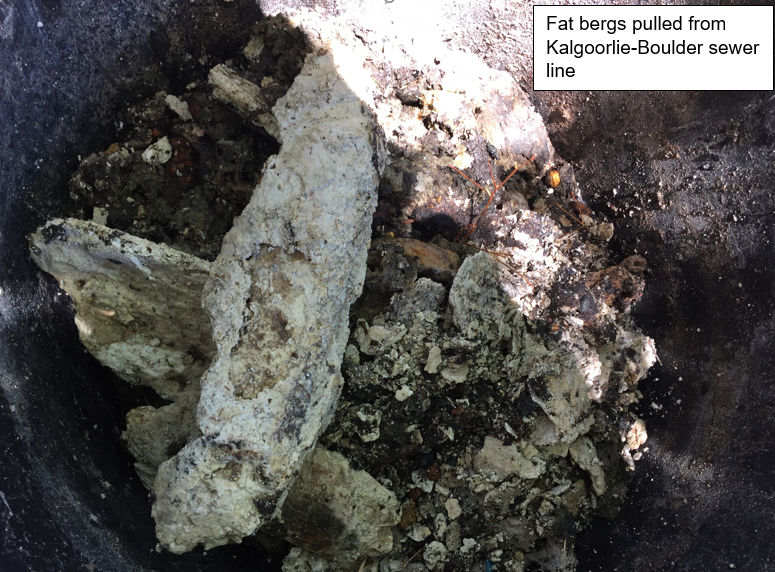
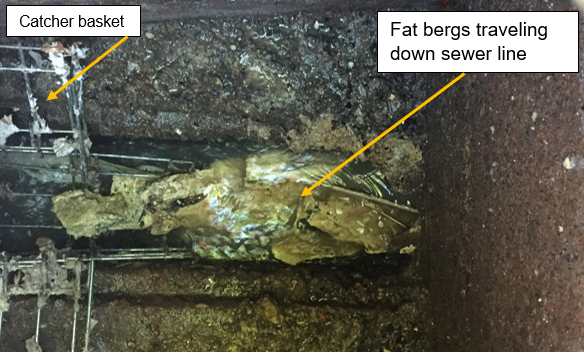
Trees and Tree Roots - what are they doing to your sewer?
Did you know tree roots can block your sewer pipes?
Tree roots can extend approximately 1.5 times the length of the tree’s branches. The root system of a tree actively seeks out essential nutrients and water for its survival. If there is a small fracture or gap in your sewer pipe, whether at the pipe joint or due to ground movement, fine hair-like roots may infiltrate these cracks in search of moisture. Once inside, these small roots can develop into larger masses, potentially obstructing and damaging the pipes, which may lead to significant sewage spills.
What can I do to avoid pipe damage?
First, it is advisable to determine the location of your internal sewer pipes within your property. You can accomplish this by either contacting a local plumber or visiting the council administration building at 577 Hannan Street to inquire if there is a sewer drawing of your property available in our system.
Please note that in some areas of Kalgoorlie-Boulder, the main sewer pipes may run within property boundaries. If you are uncertain whether your property contains a main sewer line, you may contact the council at 9021 9600 and ask to speak with the Wastewater Services Team.
The next step is to select your tree with care. We recommend consulting your local nursery for guidance on the root structure and growth habits of the trees you are considering. Native plants and trees are often an excellent choice, as they are better adapted to the local environment.
To assist you in choosing the appropriate tree or shrub for your property, a list has been compiled by the Water Corporation. We have included a link to this list in our quick links section for your convenience.
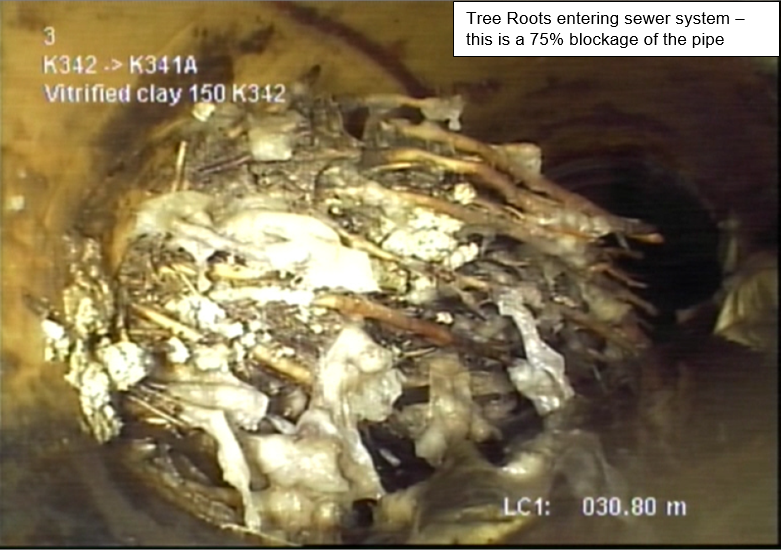
Maintenance Jetting within our sewer system
Sewer jetting is an effective method for cleaning sewer and drain lines by utilizing high-pressure water streams through specialized jetting nozzles to dislodge and remove obstructions, such as tree roots, fats, grease, and wipes, among others.
By conducting regular sewer jetting, we can significantly reduce the risk of blockages and sewer overflows within our community. The City of Kalgoorlie-Boulder is responsible for maintaining just over 208 kilometers of sewer line, and it is important to note that sewer jetting alone is insufficient; we need your collaboration.
You can assist by properly disposing of kitchen fats and oils, ensuring that no foreign objects are introduced into toilets or drains, and, if a main sewer line runs through your property, making sure that no structures or large trees are planted directly above it.